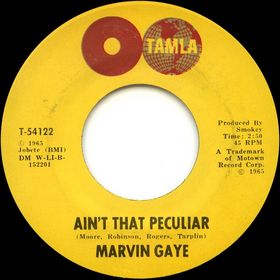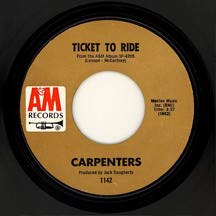Originally inspired by a police brutality incident witnessed by Renaldo “Obie” Benson, “What’s Goin’ On” was composed by Benson, Al Cleveland and Gaye and produced by Gaye himself. Bassist James Jamerson was pulled into the session after Gaye located him playing with a band at a local bar. Respected Motown arranger and conductor David Van De Pitte said later to Ben Edmonds that Jamerson “always kept a bottle of [the Greek spirit] Metaxa in his bass case. He could really put that stuff away, and then sit down and still be able to play. His tolerance was incredible. It took a hell a lot to get him smashed.” The night Jamerson entered the studio to record the bass lines to the song, Jamerson couldn’t sit properly in his seat and, according to one of the members of the Funk Brothers, laid on the floor playing his bass riffs.
Marvin Gaye’s “Ain’t That Peculiar” Isolated Bass and Drums
The single was produced by Smokey Robinson, and written by Robinson, and fellow Miracles members Ronald White, Pete Moore, and Marv Tarplin. One of the driving forces behind this awesome song was the innovative bass playing of James Jamerson. Here’s the isolated bass and drum tracks to the great Marvin Gaye’s hit “Ain’t That Peculiar,” which reached #8 on the Billboard Hot 100 chart in 1965.
Karen Carpenter’s (of The Carpenters) isolated vocals for The Beatles’ Ticket To Ride
When siblings Richard and Karen Carpenter released their debut album in 1969, nobody could predict the enormous success they would achieve throughout the next decade. With Karen’s angelic voice and Richard’s stellar arrangements, The Carpenters became a musical force to be reckoned with. Their popularity spread from the U.S. to Europe, Japan, Australia and beyond. Even after 25 years after Karen’s death, they are one of the most recognizable pop duos in music history, and deservedly so.
Their version of The Beatles’ “Ticket To Ride” peaked at number 54 on the Billboard Hot 100 during a 12 week stay, and reached number 19 on the Adult Contemporary chart. At the time of its initial release in 1969 under the album title Offering, (with a completely different cover photo) it was a commercial failure and the record label only released this cover as a single. After the Carpenters’ subsequent breakthrough, however, the album was reissued internationally under the name Ticket to Ride and sold better – but not much.
Marvin Gaye’s “I Heard It Through The Grapevine” Isolated Vocals
Originally recorded by Smokey Robinson & the Miracles in 1966, that version was rejected by Motown owner Berry Gordy, who told Whitfield and Strong to make it stronger. After recording the song with Marvin Gaye in 1967, which Gordy also rejected, Whitfield produced a version with Gladys Knight & the Pips, which Gordy agreed to release as a single in September 1967, and which went to number two in the Billboard chart. The Marvin Gaye version was placed on his 1968 album In the Groove, where it gained the attention of radio disc jockeys, and Gordy finally agreed to its release as a single in October 1968, when it went to the top of the Billboard Pop Singles chart for seven weeks from December 1968 to January 1969 and became for a time the biggest hit single on the Motown label.
So, for all of you who have been turned down by a record label, always know even the best didn’t know what they were hearing.
Hindsight, huh?
Queen and David Bowie – ‘Under Pressure’ isolated vocals. Mind. Blown.
This week in 1982, Queen released their Hot Space album, containing this massive hit, “Under Pressure.” Fun fact: This was only the second UK #1 hit for Queen. They hit #2 with “Crazy Little Thing Called Love,” “We Are The Champions,” “Somebody To Love,” and “Killer Queen,” but their only previous #1 in England was “Bohemian Rhapsody.”
Brian May recalled to Mojo Magazine October 2008 that “It was hard, because you had four very precocious boys and David, who was precocious enough for all of us. David took over the song lyrically. Looking back, it’s a great song but it should have been mixed differently. Freddie and David had a fierce battle over that.”







